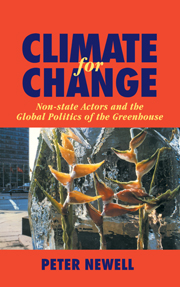Book contents
- Frontmatter
- Contents
- Acknowledgements
- 1 Politics in a warming world: introduction
- 2 Existing approaches: problems and limitations
- 3 Knowledge, frames and the scientific community
- 4 Climate of opinion: the agenda-setting role of the mass media
- 5 Climate for business: the political influence of the fossil fuel lobbies
- 6 Climate for change: environmental NGOs
- 7 Conclusion: states, NGOs and the future of global climate politics
- Appendix A List of abbreviations
- Appendix B Chronology of the international response to the issue of climate change
- References
- Index
1 - Politics in a warming world: introduction
Published online by Cambridge University Press: 02 December 2009
- Frontmatter
- Contents
- Acknowledgements
- 1 Politics in a warming world: introduction
- 2 Existing approaches: problems and limitations
- 3 Knowledge, frames and the scientific community
- 4 Climate of opinion: the agenda-setting role of the mass media
- 5 Climate for business: the political influence of the fossil fuel lobbies
- 6 Climate for change: environmental NGOs
- 7 Conclusion: states, NGOs and the future of global climate politics
- Appendix A List of abbreviations
- Appendix B Chronology of the international response to the issue of climate change
- References
- Index
Summary
Introduction
To understand the ebb and flow of the climate change issue in national and international contexts requires an appreciation of the way in which political power is exercised by different groups in pursuit of their aims and objectives.
(O'Riordan and Jordan 1996:78)This book is concerned with explanations of the content and formulation of international climate policy; the way in which one might account for the efforts of the international community to engage with the question of human interference with the global climate system. In an attempt to understand the nature and scope of international climate policy from a new perspective, discussion focuses on the political impact of four sets of non-governmental actors whose importance has not been conceptualised in a developed manner in the literature on global warming. The terms non-governmental and non-state actors are used interchangeably throughout the book and refer to actors that are not officially part of national government.
The four groups of non-state actor looked at in relation to the politics of global warming are Working Group 1 of the IPCC (Intergovernmental Panel on Climate Change), the mass media, the fossil fuel lobbies and environmental pressure groups. These non-governmental actors in particular, have been chosen as a means by which to challenge predominant explanations in the literature on global environmental politics, which generally lack analysis of these actors. Hence the purpose of this book is twofold. Firstly, it seeks to redress the imbalance in the international relations literature on global environmental politics towards state-centric analysis of ‘regimes’ as the key location for explanations of political outcomes. It does this by focusing upon the importance of sub- and trans-state non-governmental actors.
- Type
- Chapter
- Information
- Climate for ChangeNon-State Actors and the Global Politics of the Greenhouse, pp. 1 - 22Publisher: Cambridge University PressPrint publication year: 2000



